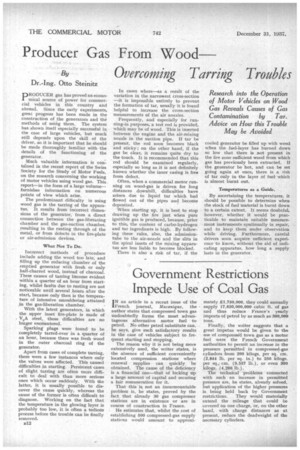Government Restrictions Impede Use of Coal Gas
Page 24

If you've noticed an error in this article please click here to report it so we can fix it.
I N an article in a recent issue of the French journal, Mecartique, the author states that compressed town gas undoubtedly forms the most advantageous alternative motor fuel to petrol. No other petrol substitute can, he says, give such satisfactory results in the case of vehicles subject to frequent starting and stopping.
The reason why it is not being more extensively used, the writer states, is the absence of sufficient conveniently located compression stations where renewal supplies can quickly be obtained. The cause of the deficiency is a financial one—that of locking up a large amount of capital and securing a fair remuneration for it.
That this is, not an insurmountable problem is, he states, proved by the fact that already 30 gas compressor stations are in existence or are in course of construction in France.
He estimates that, whilst the cost of establishing 500 compressed-gas supply stations would amount to approxi
mately £1,760,000, they could annually supply 17,650,000,000 cubic ft. of gas and thus reduce France's yearly imports of petrol by as much as 300,000 tons.
Finally, the writer suggests that a great impetus would be given to the use of compressed town gas as a motor fuel were the French Government authorities to permit an increase in the pressure permitted in compressed-gas cylinders from 200 kilogs. per sq. cm. (2,844 lb. per sq. in.) to 250 kilogs. per sq., cm. (3,557 lb.), or even 300 kilogs. (4,266 lb.).
The technical problems connected with such an increase in permitted pressure are, he states, already solved, but application of the higher pressures is being held back by Government
restrictions. They would materially extend the mileage that .could he covered on one charge, or, on the other hand, with charge distances as at present, reduce the deadweight of the necessary cylinders.
































